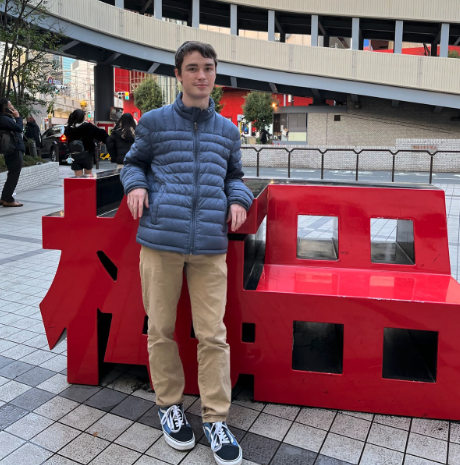Studying Away: Kansai Gaidai Direct Exchange
Max Harvey-Wilson ’23 had the desire to learn Japanese and study in Japan since high school.

“One of the things I wanted to do was to find people who only spoke Japanese and people I could really practice Japanese with,” he said.
For Hugh Stoll ’24, who studies Japanese and literature, studying in Japan was the natural next step in developing his language skills.
“The existence of the direct exchange program and Yoshida-sensei encouraging us all to apply was enough to push me to try for it,” he said.
Harvey-Wilson and Stoll are among six students in the past two terms (two in the fall and four this spring) who have studied away through a direct exchange with Kansai Gaidai University (KGU) in Hirakata, Japan. Approximately 15–20 Bennington students study away during the average academic term.
“The process of traveling so far abroad by myself was an educational experience,” said Stoll. “And I got a chance to study Japanese literature in greater detail than I would have been able to study here at Bennington, so that was really helpful considering my major.”
Harvey-Wilson experienced big gains in language skills too. He had conversations with the employees at a local drugstore when business was slow. He joined a small calligraphy club and a creative publishing club, where he met Japanese students and discussed their shared interests.
“My experience learning Japanese was really fulfilling,” Harvey-Wilson said. “I never felt progression in the way I had felt learning a language. I guess it really had an impact on me, because I plan to make it part of my career.”
He was recently accepted to teach English in Japan with the prestigious Japan Exchange and Teaching (JET) Program.
About Direct Exchange
The direct exchange with Kansai Gaidai allows Bennington students to pay Bennington College, using aid they have received to attend Bennington for a term at Kansai Gaidai.
“We always encourage students to ‘think outside of Bennington,’” said Japanese Language and Culture faculty member Ikuko Yoshida. “But we also want them to think outside of the U.S. If you are attending Bennington, you can attend Kansai Gaidai.”
Yoshida has been integral in developing the direct exchange with Kansai Gaidai and Sophia University, both in Japan.
For some students, especially those who receive need-based aid to attend Bennington, a direct exchange is less expensive than the other study away options, where students pay some or all of their tuition, housing, and meals costs directly to the host institution.
“Being able to alleviate the academic costs is extremely helpful, since travel costs are already pretty expensive,” said Stoll.
And studying away is not just for language students.
Direct exchange with Kansai Gaidai is available to students studying Japanese and to those studying other disciplines. Those who make Japanese their primary area of study, like Harvey-Wilson and Stoll, take Japanese every term, and then they go to Kansai Gaidai, usually during their junior year.
“But students are not required to have Japanese as a primary or even a supporting area of study to go on the Kansai Gaidai exchange,” said Stephanie Meyer, assistant director of Academic Services and study away counselor. “We do ask that they complete at least one term of Japanese language class here at Bennington to be eligible.”
The Benefits
One of the most beneficial aspects of the direct exchange with Kansai Gaidai is how it increases diversity on both Bennington’s campus and on Kansai Gaidai’s. According to Yoshida, racial, socioeconomic, and philosophical diversity makes classes more enjoyable for everyone.
“I think the most important thing is to seek out as many different ideas as you can in the world and try to synthesize them into a worldview of your own,” said Stoll. “You can't do that if you don't seek to learn from people outside of your race, nationality, gender...”
Studying away has given him a broader worldview.
“There are a lot of things out there that we don't even realize we don't know,” he said. “I think the more you learn from others unlike yourself the more you're able to curb the impulse to push back and try to make everything make sense in our old worldview. It’s better to go at things with a spirit of curiosity and understanding.”
Beyond enjoyment, diversity is crucial to the future of global society, Yoshida said. She sees cuts to language and culture programs at other higher education institutions across the United States as a threat to peace.
“In the 21st century, people don’t understand each other, and wars are happening all over the world,” Yoshida said. “I think it is really important for students to learn how to communicate with people who come from other cultures.”
Harvey-Wilson sees the larger significance of experiencing different cultures and perspectives as well.
"Having a wider experience of knowing any culture makes you more open-minded, and I think that’s really important, to be frank, in a world that is increasingly polarized,” he said.
The Effort
Developing direct exchange programs to broaden opportunities for students is difficult, time consuming, and expensive work, said Yoshida. She used her own professional connections to Kansai Gaidai to visit the university and evaluate whether Bennington and Kansai Gaidai would make good direct exchange partners. Her main interest was whether or not the relationship would benefit students from both institutions.
“Bennington’s education is not like regular education. It’s so progressive,” Yoshida said. “Here, students design their study, which is really unusual, especially at Asian institutions.”
Given the value of direct exchange programs for expanding students’ awareness of varied points of view, Yoshida and other language faculty members are working to increase access to direct exchange opportunities. A second direct exchange with Sophia University in Tokyo is available for the fall term.
Read about Ryota Terashima ’24, a Kansai Gaidai student who attended Bennington through the direct exchange program.